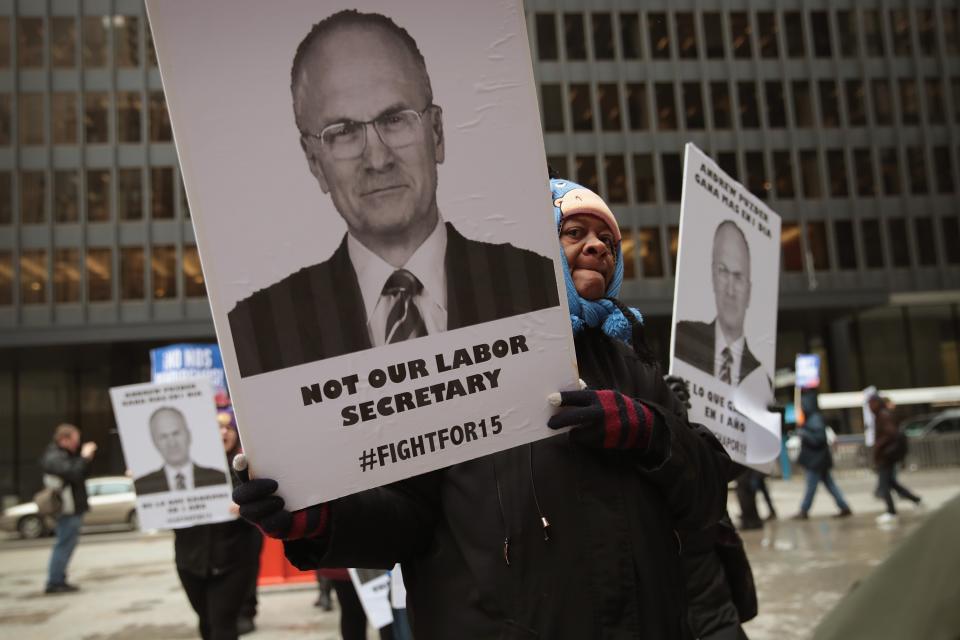Trump's most endangered Cabinet nominee
Several of President Donald Trump’s Cabinet nominees have stoked controversy, and a few have given shaky performances in Senate confirmation hearings. But all have progressed toward a normal Senate vote, except for one—fast-food CEO Andrew Puzder, Trump’s nominee for Labor Secretary, who is stuck in procedural purgatory, a lag that could indicate his nomination is doomed.
Trump nominated Puzder on Dec. 8, which was nearly 8 weeks ago. But his Senate confirmation hearing has been delayed four times, because he hasn’t cleared the necessary hurdles at the Office of Government Ethics, or OGE, which vets nominees for potential conflicts of interest and helps guide many on how to resolve them. That makes Puzder the only Cabinet nominee so far whose ethics paperwork hasn’t made it to the Senate, a snag that suggests there’s something unusual in Puzder’s background, or an unforeseen ethical problem.
Democrats smell blood, and hope Puzder could be a prominent kill among high-profile Trump nominees. Dems need at least two Republicans on the Senate Health, Education, Labor and Pension Committee (or HELP) to vote against Puzder, in order to sink his nomination. Two women senators—Susan Collins of Maine and Lisa Murkowski of Alaska—may be the toughest votes for Puzder to win, due to sexually provocative ads CKE has run under Puzder, and a few claims of sexual harassment at CKE outlets. If Puzder can’t win a majority of Republicans on the HELP committee, he probably wouldn’t make it to the broader Senate for a full confirmation vote.

Trump’s pick for Education Secretary, Betsy DeVos, is another troubled nominee, but she at least seems headed for a vote. Puzder may not get that far. For now, his nomination is stuck at the Office of Government Ethics, which doesn’t do political vetting, looking for potential scandals that might emerge from a nominee’s personal life. That’s for Trump’s transition team to worry about. Instead, OGE mostly analyzes a nominee’s financial ties, to make sure he or she complies with laws that prevent government officials from capitalizing personally on their government role. And Puzder’s case ought to be simple compared with some of Trump’s other nominees.
Former Exxon Mobil (XOM) CEO Rex Tillerson, just confirmed as Trump’s Secretary of State, cleared all the major confirmation hurdles in about one month. As part of Tillerson’s ethics agreement, he’ll exchange all the Exxon stock he holds for cash, give up a bunch of Exxon retirement perks and sell his shares in 156 mostly public companies within 90 days.
Trump’s pick for Treasury Secretary, Steven Mnuchin, and Commerce Secretary, Wilbur Ross, are both private investors with financial stakes in dozens of businesses. Mnuchin’s ethics agreement lists 43 business entities he’ll sell stakes in if confirmed, and another 42 in which he holds a position, such as director, he’ll resign from. Ross’s filing lists at least 48 businesses and other organizations he’ll cut ties with. Both men have been through confirmation hearings and are likely to be confirmed for their new jobs soon.
The most controversial Cabinet nominee
Puzder ought to sail through the ethics process, compared with the complexities those three have to work through. Puzder, a lawyer, has worked for CKE Restaurants, parent of the Hardee’s and Carl’s Jr. chains, since 1997, and been CEO since 2000. The firm, which used to be publicly owned, went private in 2010. At the time, Puzder owned shares worth about $18 million. He may still have a minor ownership stake in the firm, which is primarily owned by Roark Capital. But Puzder would have known he’d have to divest any interest in CKE when Trump tapped him for Labor, so that’s unlikely to explain the holdup with his nomination.
Puzder is also one of Trump’s most controversial nominees, which might have more to do with his stalled confirmation process than his financial ties. CKE employees recently filed 33 complaints against the chain’s stores in 10 states, for labor-law violations such as wage theft, on-the-job intimidation and sexual harassment. Those complaints target individual restaurants—some of which are franchises—not Puzder himself. But critics say Puzder, as CEO, set a combative tone that encouraged store owners and managers to mistreat workers.
Puzder is also an outspoken critic of the minimum wage and other regulations meant to protect workers, arguing that they exert too high a toll on business owners. That has earned him the enmity of workers’ groups pressuring senators to vote against Puzder. Another vulnerability: Under Puzder’s watch, CKE outsourced part of its IT department to the Philippines, a violation of Trump’s own make-it-in-America-or-else diktat. There’s also a claim by an ex-wife, now recanted, that Puzder abused her when the two were married in the 1980s.
Still, Puzder has been a vocal critic of Obama-era policies who seems to thrive on controversy. He’s known for ordering up provocative commercials featuring nearly naked women writhing as they enjoy their burgers, and for scoffing when feminist groups complain. If he ever gets a confirmation hearing, he’ll have some ‘splaining to do to the Senate HELP Committee, which includes six women. But he would have known that, too, when he accepted the nomination.
So what’s Puzder hiding? That’s the question swirling on Capitol Hill, as other controversial Trump nominees, such as DeVos and Tom Price, Trump’s pick to head Health and Human Services, move through the confirmation process. But the longer the delay for Puzder, the more doubt builds. And President Trump isn’t known for being a patient guy.
Confidential Newman tip line: [email protected]
Rick Newman is the author of four books, including Rebounders: How Winners Pivot from Setback to Success. Follow him on Twitter: @rickjnewman.
